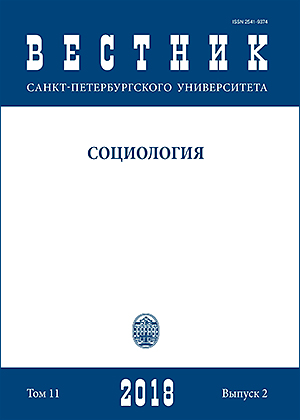Civil solidarity in the sphere of public security
DOI:
https://doi.org/10.21638/11701/spbu12.2018.203Abstract
The article attempts to discover efficient integration measures aimed at overcoming the negative consequences of social anomie in contemporary Russia. The author of the article argues that social anomie as a result of the transformational post-perestroika era processes had a negative impact on the current crime situation in Russia. The author based his ideas on the theoretical model proposed by Emile Durkheim and developed by Robert Merton. This effect is illustrated in the article by the statistics of offences occurred between 1985 and 2016. The necessity of finding the effective measures to stabilize the crime situation caused by the crisis of social integration makes a methodological description of such concepts as social solidarity essential, as this term has a positive integration orientation. Theoretical analysis of different approaches to the definition of the nature of social solidarity (contained in the opinions of scholars such as Auguste Comte, Emile Durkheim, Henri Bergson, Max Weber, and Talcott
Parsons) allows making a conclusion about the high theoretical and practical feasibility of using such particular varieties of social solidarity as civil solidarity. Realizing a model of stream consolidation offered by O. Karmadonov, the author makes an attempt of a practical study concerning the peculiarities of civil solidarity in the field of public safety. The results of the conducted study reveal a number of disintegrating factors in this sphere, the neutralization of which, in the opinion of the author, can have a positive impact on embeddedness and depth of solidary behavior demonstrated by the citizens in the field of public security.
Keywords:
civil solidarity, social anomie, solidarity behavior, the factors of disintegration, crime, public security
Downloads
References
References
Downloads
Published
How to Cite
Issue
Section
License
Articles of "Vestnik of Saint Petersburg University. Sociology" are open access distributed under the terms of the License Agreement with Saint Petersburg State University, which permits to the authors unrestricted distribution and self-archiving free of charge.




